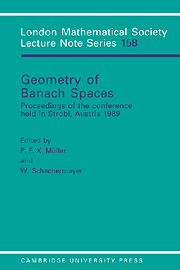Book contents
- Frontmatter
- Contents
- Foreword
- List of Main Lectures
- List of Participants
- A note on H. Ishihara and W. Takahashi modulus of convexity
- A property of non-strongly regular operators
- The entropy of convex bodies with ‘few’ extreme points
- Spaces of vector valued analytic functions and applications
- Notes on approximation properties in separable Banach spaces
- Moduli of complex convexity
- Grothendieck type inequalities and weak Hilbert spaces
- A weak topology characterization of l1 (m)
- Singular integral operators: a martingale approach
- Remarks about the interpolation of Radon-Nikodym operators
- Symmetric sequences in finite-dimensional normed spaces
- Some topologies on the space of analytic self-maps of the unit disk
- Minimal and strongly minimal Orlicz sequence spaces
- Type and cotype in Musielak-Orlicz spaces
- On the complex Grothendieck constant in the n-dimensional case
- Pathological properties and dichotomies for random quotients of finite-dimensional Banach spaces
- A note on a low M*-estimate
- The p1/p in Pisier's factorization theorem
- Almost differentiablity of convex functions in Banach spaces and determination of measures by their values on balls
- When E and E[E] are isomorphic
- A note on Gaussian measure of translates of balls
- Sublattices of M(X) isometric to M[0,1]
Sublattices of M(X) isometric to M[0,1]
Published online by Cambridge University Press: 03 May 2010
- Frontmatter
- Contents
- Foreword
- List of Main Lectures
- List of Participants
- A note on H. Ishihara and W. Takahashi modulus of convexity
- A property of non-strongly regular operators
- The entropy of convex bodies with ‘few’ extreme points
- Spaces of vector valued analytic functions and applications
- Notes on approximation properties in separable Banach spaces
- Moduli of complex convexity
- Grothendieck type inequalities and weak Hilbert spaces
- A weak topology characterization of l1 (m)
- Singular integral operators: a martingale approach
- Remarks about the interpolation of Radon-Nikodym operators
- Symmetric sequences in finite-dimensional normed spaces
- Some topologies on the space of analytic self-maps of the unit disk
- Minimal and strongly minimal Orlicz sequence spaces
- Type and cotype in Musielak-Orlicz spaces
- On the complex Grothendieck constant in the n-dimensional case
- Pathological properties and dichotomies for random quotients of finite-dimensional Banach spaces
- A note on a low M*-estimate
- The p1/p in Pisier's factorization theorem
- Almost differentiablity of convex functions in Banach spaces and determination of measures by their values on balls
- When E and E[E] are isomorphic
- A note on Gaussian measure of translates of balls
- Sublattices of M(X) isometric to M[0,1]
Summary
Introduction
Let X,Y always denote infinite Polish spaces and M(X) stands for the Banach space of Radon measures on X with the variation norm. While the isometric type of sublattices of L1(X,μ) for some μ ε M(X) is completely understood (they are either l1,L1[0,1], or l1⊕ L1[0,1], see e.g. [S] III Prop. 11.2) the structure of sublattices of M(X) is much more complicated. Interesting examples of such sublattices are the Henkin-measures on the unit sphere of Cn for n > 1 (see [Rn], Chap. IX), Rajchman measures on the unit circle (see [Ke], Chap. IX), invariant mesures of a family of measurable tranformations of X (see [Ph], Chap. X) and, more generally, the invariant measures of a H-sufficient statistic in the sense of Dynkin (see [Dy], [Ma]). The first two examples are actually bands in M(X) and there is a very nice characterization of such bands in terms of the compact subsets of X that they annihilate due to Mokobodski ([Ke], Chap. IX. 1). The last two examples are usually true sublattices of M(X) isometric to M(0,1).
In this note we characterize sublattices L of the latter kind, (i.e. L is isometric to M(0, 1))in terms of the existence of strongly affine projections, the w*-Radon-Nikodymproperty, martingale compactness, a choquet-type integral representation theorem and finally in terms of the embedding of their unit sphere into M(X) (see section 2 for precise statements).
Information
- Type
- Chapter
- Information
- Geometry of Banach SpacesProceedings of the Conference Held in Strobl, Austria 1989, pp. 257 - 270Publisher: Cambridge University PressPrint publication year: 1991
